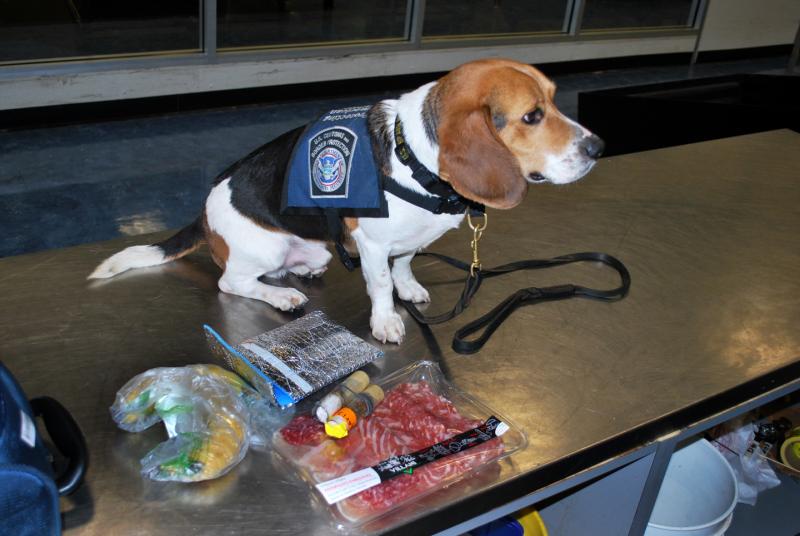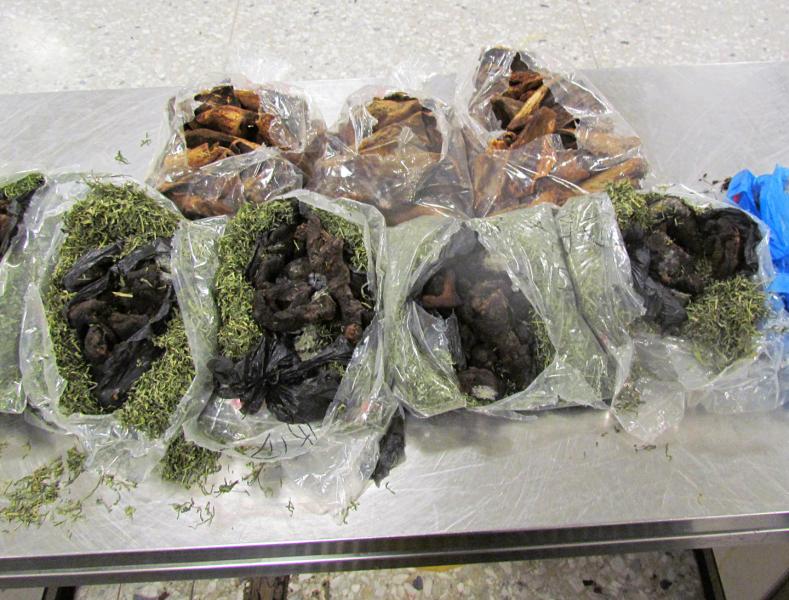Prohibited Agriculture Products May Pose Serious Threat to U.S. Economy
BALTIMORE – As usual, summer brings an increase in the number of international travelers arriving at Washington Dulles International Airport. This increase in travelers also means that Customs and Border Protection expects to see an increase in prohibited agriculture products, particularly products that pose potential threats to United States agriculture.
Three recent seizures illustrate the enormous and often overlooked threat that U.S. Customs and Border Protection agriculture specialists encounter every day to protect our nation’s agriculture.

and insect vials he sniffed May 26.
On May 26, a CBP agriculture detector dog alerted to the baggage of a U.S. university professor who arrived on a flight from Paris, France. Upon inspection, CBP agriculture specialists discovered two pounds of ham, two bananas, and two large vials that contained adult, larvae and pupae fruit flies with a food source. The professor admitted to bringing the fruit flies to the U.S. for research without a permit. CBP agriculture specialists submitted the insects to the U.S. Department of Agriculture entomologist for identification and incinerated the ham and bananas.
On May 11, CBP agriculture specialists inspected the baggage of an intending immigrant from Cameroon and discovered nearly nine pounds of dried beef in chopped dried leaves and another nine pounds of cow skins concealed in clothing. All meat products and leaves were incinerated.
On May 7, CBP agriculture specialists inspected the baggage of a traveler from Laos and discovered approximately nine pounds of dried buffalo skin chips and another nine pounds of buffalo jerky. All meat products were incinerated.
Fruit fly host material raises serious concern for the introduction of Mediterranean fruit fly.
The meat products were inadmissible and destroyed, a safeguarding measure to prevent the introduction of foreign animal diseases, such as Foot and Mouth Disease, Bovine Spongiform Encephalopathy, commonly known as mad cow disease, and African swine fever.
“Customs and Border Protection agriculture specialists have a challenging job in protecting our nation’s economy and agriculture against the accidental or deliberate introduction of animal diseases, plant diseases, invasive insects or federal noxious weeds that could potentially cripple our nation’s livestock and crop industries,” said Casey Durst, CBP Director of Field Operations in Baltimore. “CBP agriculture specialists exercise extreme vigilance to intercept these threats at our nation’s ports of entry every day to protect our citizens’ food sources and our economic vitality.”

beef and cow skins from a Cameroon
traveler's baggage May 11, 2019.
“Travelers may think that agriculture products are an innocuous concern; however, these agriculture threats could potentially have the most damaging impact to our nation’s economic security than nearly anything else we encounter,’ Durst said.
CBP urges travelers to visit CBP’s Travel website before returning from an overseas vacation, or if visiting the United States on holiday to learn about the inspection process, bringing food to the United States, and items that may be prohibited or restricted from entering the U.S.
Planning ahead can save time and lead to a less stressful trip. Click for more CBP travel tips.
On a typical day, CBP processes more than one million travelers who arrive at airports, seaports and land border crossings across the United States, and CBP agriculture specialists interdict 4,552 prohibited meat, plant materials or animal products, and intercepts 319 agriculture pests and diseases. Learn more about what CBP achieves during a “Typical Day.”
CBP’s mission is to facilitate legitimate travel while maintaining the highest standards of security for those who live here and for those who visit. Learn more at www.CBP.gov.


